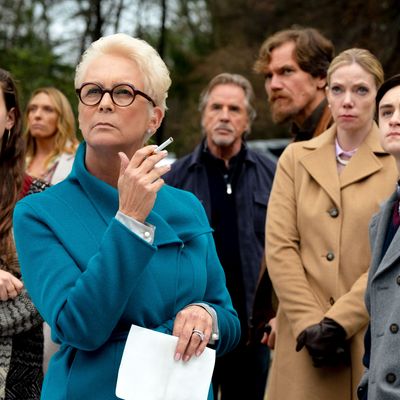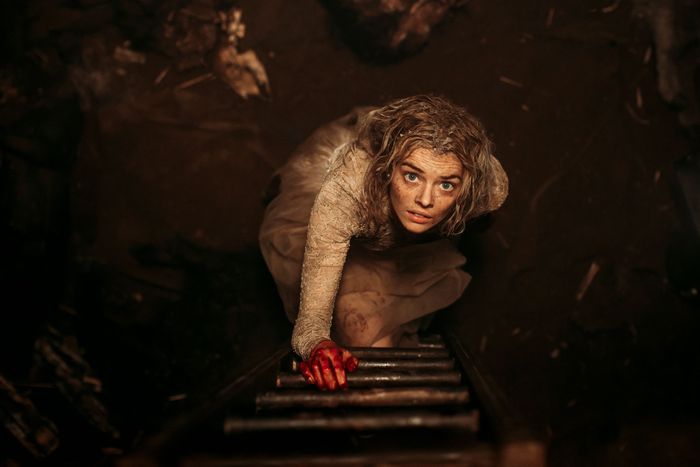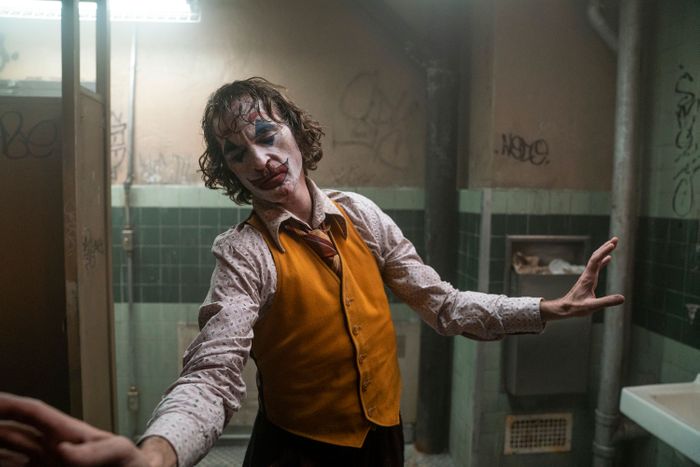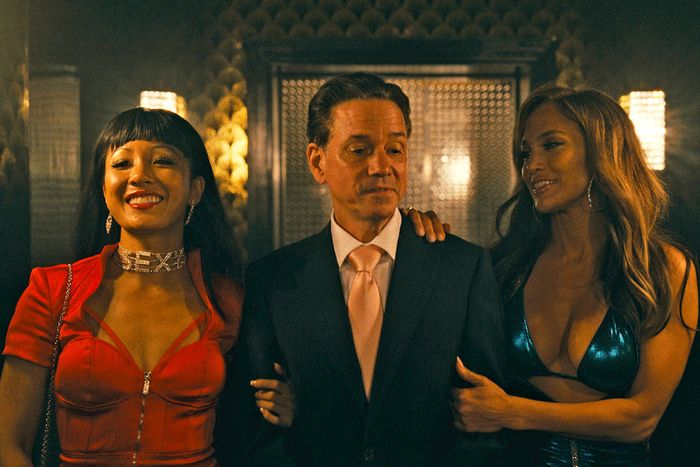
The Thrombeys, the family whose members make up the bulk of the characters in Rian Johnson’s new movie, Knives Out, represent a rich assortment of awfulness. Linda (Jamie Lee Curtis) takes every chance to burnish her reputation as a self-made businesswoman, never mentioning the sizable starter loan she was given. Hubby Richard (Don Johnson) appears to be simply along for the ride, at least until the affair he’s been having comes to light. Linda’s brother, Walt (Michael Shannon), has resentfully spent his life on their famous novelist father’s payroll, while their wellness-happy sister-in-law Joni (Toni Collette) opts out of work entirely, double-dipping into the family fortune to subsidize her lifestyle. Of the younger generation, Jacob (Jaeden Martell) is a budding alt-right troll, while Meg (Katherine Langford) is a student whose activism runs only skin-deep, and Ransom (Chris Evans) is just your classic spoiled scion. They’re people stunted by their proximity to wealth, and the only thing they can agree on is their desire to remain that way.
Knives Out is an old-fashioned whodunit. It has an eccentric victim (Thrombey patriarch Harlan, played by Christopher Plummer), an atmospheric location (Harlan’s kitschy mansion), and a brilliant detective (Daniel Craig, chewing on a theatrical southern accent like it’s a rare steak). But there’s a streak of class rage running through the film that feels very 2019. The villain of the story isn’t simply the culprit, though of course there is one, the way there is in every murder mystery. Here, the villains are the Thrombeys as a whole — who, regardless of whether they’ve actually killed someone or not, feel a real bloodthirst for what they assumed would be their inheritance. When it becomes clear that Harlan’s riches might not be theirs, the rapacious relatives engage in a pitiless game of belonging and entitlement that lays bare the relationship they’ve always had to those less moneyed than themselves. Whatever they may individually claim to believe about the world, when it comes to their own situation, they feel that wealth is owed to them and that no one else is as deserving. Deep pockets aren’t just a means to a well-lived life but the result of “winning” in a system that demands most of us must lose.
Class warfare isn’t a theme unique to Knives Out — it’s an undercurrent running through a slew of this season’s movies, from Joker to Hustlers to Parasite, a Korean import that has resonated hugely with American audiences. The only surprising thing about this trend is that it took so long to make itself felt at the Cineplex at a time when income inequality in the U.S. is the highest it has been since the Census Bureau started tracking it 52 years ago and when the presidency is an ongoing treatise on the tyranny of inherited wealth and nepotism. Finally, class rage on the big screen provides a reflection of the particular despair and frustration underscoring our real-world present, where the divide between security and anxiety, both here and abroad, is ever more cavernous.
But these depictions are also fractured in a way that reveals the split in the conversations we have about wealth. In some of this year’s films, the rich are the easy-to-loathe antagonists, while others reach for the larger, more nebulous target of the system that enables and empowers them.
The Thrombeys are the former, obviously, and deliciously so, a celebrity-heavy array of the privileged and morally lacking who go to war against Knives Out’s diligent heroine — Harlan’s immigrant nurse, Marta Cabrera (Ana de Armas) — only to find themselves outmatched because she has a sense of right and wrong they hadn’t accounted for. It’s pitched as a battle of evil versus good, and it has a horror-movie equivalent in Ready or Not, in which the well-off Le Domas family spars against a would-be newcomer to their name. Grace (Samara Weaving) had no idea she was marrying into a dynasty that perhaps owes its fortune to a deal with the Devil, with members who fulfill their obligations of ritualized human sacrifice as though they could actually die if they weren’t rich. In both films, a family mansion is filled with passages and secrets, but in Ready or Not, the class warfare is more literal and carried out with antique weapons, with the servants becoming fodder first.
Ready or Not wasn’t the year’s only horror movie in which members of the economic elite attempt the most dangerous game, but it was the only one to get a wide release. The Hunt got yanked from theaters before it premiered in the wake of two mass shootings and, maybe more relevant, presidential attention on what looked like a story about wealthy liberals trying to kill “deplorables.” There’s no way to know if that’s true (no one but a select group of press ever saw it), though the takeaway from the whole debacle seemed to be something along the lines of violent class warfare being fine as long as it’s not overtly political. And if that seems inherently contradictory, well, just look at Joker, a movie of deliberately unparsable ideology that escalates to a finale in which anti-fascist rioters flood the streets of Gotham and become the ones responsible for one of the most frequently restaged murders in comic-book adaptations. Whatever the legitimate roots of the rioters’ anger may be, in the movie they’re basically an external manifestation of the main character’s inner turmoil — suckers who misread his actions as a larger protest and took him up as an icon when it’s not change he wants, but chaos.
Ironically, Steven Soderbergh’s The Laundromat, a satire that strives to be explicitly political, ends up in a similarly muddled place by reaching too wide with its selection of Panama Papers stories. Explanatory vignettes about tax shelters, trust funds, shell corporations, and reinsurance fraud are presented as a series of late-capitalist fables about how the one percent increasingly distances itself from the rest of us. But while the ire with which these stories are presented is caustic, their targets are too diffuse for them to connect. By the time Meryl Streep strips off the costumes for her dual parts and speaks directly to the camera about campaign-finance reform, it feels like a hopelessly anticlimatic call to action in the face of everything that came before. It presents systemic problems so broad that you come away with a sense of defeat rather than one of righteous indignation — which has been part of the apocalyptic escapism of watching Succession on cable and basking in the machinations and miseries of the petty billionaires pulling the strings. TV has historically been more limber about responding to the times, while this confluence of movies feels more like it represents the bubbling up of long-simmering outrage.
People are simpler targets than the structures that support them, which is one of the things that made Lorene Scafaria’s Hustlers so wonderfully complex, with its gang of strippers who, hurting after the 2008 financial crisis, devise a way to make money and seize power in an industry that has tended to regard them as replaceable commodities. When they start targeting their finance-bro regulars, drugging them and then running up big bills at the club in their names in exchange for a cut of the profit, it’s the men who are portrayed (and framed onscreen) as interchangeable. Jennifer Lopez’s character, Ramona, rationalizes her actions by talking about what bankers have been allowed to get away with, saying, “The game is rigged, and it does not reward people who play by the rules.” She’s not wrong, as evidenced by the subprime-mortgage crisis and the subsequent bank bailout that underscores the development of their scam. But anyone who watched the film and saw it as a rubber-stamping of the characters’ actions missed how much it was about the gap that exists between railing against systemic unfairness and targeting actual individuals. The more their victims come into focus as people to Destiny (Constance Wu), the more trouble she has thinking of what they’re doing as victimless.
If films like Knives Out and Ready or Not offer the most uncomplicated catharses, with the wealthy getting their just reward at the hands of scrappy, likable outsiders, then Parasite is at the other end of the scale. It provides no straightforward outlet for the fury building up inside it, so it seems to come as a sudden surprise to those who feel it, either the characters or the audience. Bong Joon Ho’s work has always dealt with the systemic, and the Parks, the wealthy clan around which the other characters in the thriller orbit, aren’t monsters. That’s important to understand because they enjoy such loathable, enviable lives as modern aristocrats ensconced behind the elegant walls of their glass-and-concrete palace, where they are cared for by a set of employees whom they talk to but only sometimes want to speak back. It wouldn’t take much to tip them into outright villainy, but if they were monsters, Parasite would be a movie about their particular comeuppance, and instead it’s about something darker and deeper.
The Kims, who slyly maneuver their way onto the Parks’ payroll by pretending not to know one another as they take various roles as tutors, housekeepers, and drivers, pronounce the Parks to be “nice” with an asterisk: “They’re rich but still nice,” Kim patriarch Ki-taek (Song Kang-ho) declares, as his family, who normally lives in a cramped basement apartment that drunks tend to pee outside of, makes use of the Parks’ house while the wealthier characters are out of town. Getting drunk in his employer’s designer living room without his knowledge, Ki-taek has reason to feel magnanimous, though his observation prompts his wife, Chung-sook (Jang Hye-jin), to retort, “They’re nice because they’re rich.” They each have a point. South Korea has its own widening wealth gap, and the Kims regard the Parks from the opposite side of it; the Parks, meanwhile, don’t have any sense of how the Kims live at all.
The Parks have the privilege of being nice because they have so much more than they need. They’re totally unfamiliar with what desperation can lead someone to do, with the kind of poverty that defines the Kim family’s existence and has made its members willing to lie and to commit sabotage as much as necessary in order to secure their own survival. At the same time, the Parks aren’t nearly as awful as they could probably get away with being, and the bar is low enough for the upper class that that counts as a positive trait. They don’t commit any acts of cruelty. They commit only accidental ones — the kind that result from being unaware of how much they’re always being accommodated, the kind that come from never having to develop empathy for the situations of people outside the walls of their urban compound.
The thing about those oblivious slights is that they still wound, and they still add up as accrued evidence of the vast inequality of the landscape the two families occupy. The film makes this literal by showing the difference in elevation between their households, with the Park residence perched behind walls on top of a hill and the Kim apartment below ground level and vulnerable to everything from exterminators to the weather. The one time we see people making trip from one home to the other, members of the Kim family wind their way down steps and hills and through tunnels in the pouring rain, continuing down and down as though they weren’t going home but were instead being cast out of heaven. The Parks may be products of their situation just as much as the Kims are, but that doesn’t make the fury that boils beneath so much of Parasite (and that eventually boils over) any less legitimate. You don’t have to intend harm to enjoy the benefits of a system that enables harm to others.
Maybe that’s why Parasite stands out even in a season devoted to explorations, both serious and otherwise, of inequality. It works simultaneously as a darkly droll allegory about class and an intimate tragedy about two families on a collision course. The Kims are characters, not symbols, but there’s something emblematic about their striving and their tendency to see themselves simply as versions of the Parks who just haven’t attained success yet. As the son, Ki-woo (Choi Woo-shik), puts it, the credentials he faked to get his tutoring job aren’t lies, because he is determined to go to college and actually get them soon. It’s the kind of belief that Knives Out ends up implicitly underscoring — its main character, Marta, is rewarded for being hardworking, for being good at her job. But in Parasite, it’s housekeeper Moon-gwang (Lee Jeong-eun) and her hidden husband, Geun-se (Park Myeong-hoon), who end up being the warped reflections the Kims don’t want to see, living not in a basement apartment but in an actual underground bunker and feeling not a thankful affection for their employers but a servile gratitude toward them.
The Kims and their subterranean doubles immediately attempt to destroy each other because they’re not the kind of people who can afford to be nice. It’s the most brutal indignity Parasite offers — that they kill over the opportunity to maintain proximity to people who don’t see their humanity, who find them a little absurd, who don’t like the way they smell. Ki-taek and Geun-se smell the same, a commonality that the former acknowledges only when it’s too late to do anything except lash out in reaction to the sheer unfairness of the system they’re all a part of. The Parks aren’t monsters like the Thrombeys are, but the promise they represent — that their life could be attainable with the right amount of study and hard work — is illusory. They may not deserve the violence they encounter, but they also never questioned when they deserved the life of ease that preceded it.






